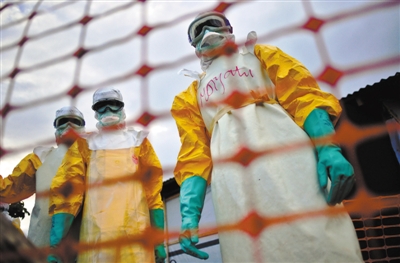In the past August, Chinese medical experts have successively confirmed two sleeping sick patients who returned from Africa. With the increasing number of Chinese working and traveling to Africa, it has become a top priority to guard against some rare tropical diseases in China. Zhou Xiaonong, director of the Center for Parasitic Diseases Prevention and Control of the Chinese Center for Disease Control and Prevention, said in an interview with reporters that before going to Africa, people should consult with the entry-exit and quarantine bureaus and other institutions to learn about tropical disease prevention and control, and strengthen personal protection in the local area. If you feel unwell after returning to China, you should seek medical advice promptly. Relevant departments should also strengthen the diagnostic and therapeutic technology reserves, and comprehensively improve the research, prevention and control and emergency response capabilities of tropical diseases. The first imported Rhodesia trypanosomiasis African human trypanosomiasis, also known as sleeping sickness, is a parasitic disease transmitted by tsetse flies. The disease is caused by two trypanosomes, the Gambia trypanosomes and the Rhodesia trypanosomes. The first case of imported African trypanosomiasis diagnosed in China in 2014 belongs to Gambia trypanosomiasis. On August 14 this year, the Chinese Center for Disease Control and Prevention of the Chinese Center for Disease Control and Prevention received the first confirmed case of imported Rhodesia trypanosomiasis, which is the second case of imported African trypanosomiasis in China. The patient traveled to Kenya and Tanzania from July 22 to August 6. He was bitten by a fly in a national park in Tanzania. After returning home, he developed symptoms such as high fever, dizziness and fatigue. The drug was given by the World Health Organization. After sodium treatment, it has been discharged. Zhou Xiaonong told reporters that the institute received a third case report of imported African trypanosomiasis on August 30, which was identified as Gambia trypanosomes. The patient was infected during work in Gabon, and on September 2, he was treated with the drugs Nifurtimox and Efluranine provided by WHO. He is currently in a stable condition but still in a state of drowsiness. What are the "weird diseases" to be warned in Africa? According to reports, Africa crosses the equator, the climate is hot, mosquitoes are alive, and infectious diseases are frequent. When traveling to Africa, people may be infected with malaria, filariasis, leishmaniasis, schistosomiasis, babesia, myiasis, cockroaches and other rare tropical diseases in China, and these "strange disease" poles Easy to be misdiagnosed. Filariasis is transmitted by mosquitoes, including lymphatic filariasis, cutaneous filariasis and visceral filariasis. Lymphatic filariasis may have fever and skin inflammation in the early stage, and limbs like elephant legs may appear in the later stage. Skin filariasis can cause skin inflammation, especially the parasitic silkworm parasitic in the eye can cause visual impairment or even blindness, also known as river blindness. Visceral filariasis is mild and may present with chest pain or rash. Leishmaniasis is a disease transmitted by an insect bite called ferrets, including visceral leishmaniasis and cutaneous leishmaniasis. Visceral leishmaniasis, also known as kala-azar, is characterized by long-term fever, splenomegaly, and anemia. The skin leishmaniasis mainly manifests as a skin nodular ulcer in the lesion, which is unbearable and it is secondary to infection after scratching. There are 1.3 million new cases worldwide each year, and the death toll is 20,000 to 30,000. Babesia is transmitted by bites of mites, similar to malaria. The severity of the disease is closely related to factors such as the age of the person, the level of immunity, and whether the spleen is removed. The milder has no obvious symptoms or only fever, and the severe ones may have fever, anemia, jaundice, hematuria, resulting in organ failure or even death. The disease can also be transmitted through blood transfusions and mother-to-child transmission. How to prevent rare tropical diseases Zhou Xiaonong reminded aid workers, non-workers and tourists. Before the trip, they should consult the various entry-exit and quarantine bureaus and other institutions to learn about tropical diseases and do the following: When traveling, try to take the car and close the window; when outdoors, apply the mosquito repellent to the exposed parts of the body; avoid going to high-risk areas, and carefully enter the breeding grounds of forests, pastures, grasslands, bushes, etc., if you must enter these environments. Should wear long trousers and stockings, try not to wear dark clothes such as black or blue to attract mosquitoes; avoid sleeping in a simple home, use mosquito nets at night or spray insecticide indoors. He also reminded non-travelers to do "several": not easy to swim in the river pond, play in the water, avoid contact with unfamiliar water bodies; pay attention to food hygiene, do not drink raw water, do not eat may be contaminated by mosquitoes and flies Food, drink, do not eat half-baked food. Zhou Xiaonong pointed out that once a non-traveler is unwell during a non-period or returning to China, he should seek medical attention immediately and take the initiative to explain to the doctor where he has been to Africa and what mosquitoes have bitten for doctors to diagnose. He also suggested that relevant departments strengthen the pathogen diagnosis and treatment technology reserve for rare imported parasitic diseases in China, establish national reserves for special effects drugs and diagnostic reagents as soon as possible, and strengthen the laboratory and prevention of rare, new and imported parasitic diseases. The configuration and guarantee of equipment will comprehensively improve the research, prevention and treatment of tropical diseases. China Extract Powder For Use As Dietary Supplement Extract Powder, Extract Powder Manufacturer Shaanxi Kang New Pharmaceutical co., Ltd. , https://www.kangnewpharmas.com